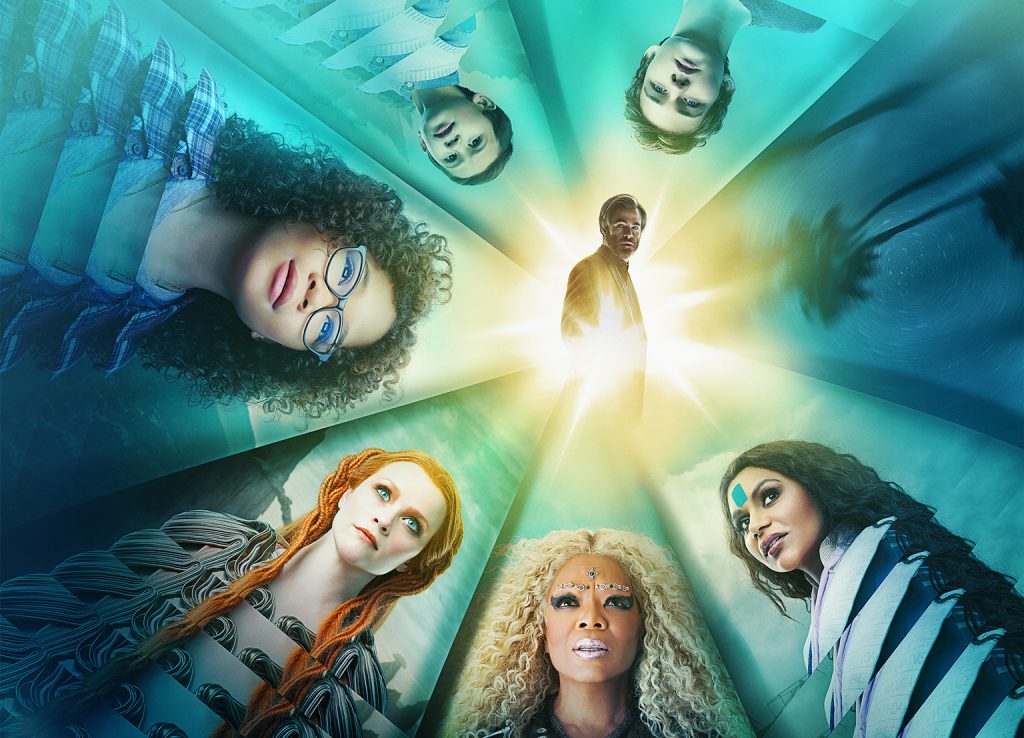
As the forty minute mark approached during my screening of Ava DuVernay’s A Wrinkle in Time (2018), I struggled with a simple question: Is it possible to review a film you walked out on? When I write about a film, I try to deliver more than a recommendation or a warning. A review should cast a spotlight on an aspect of filmmaking or storytelling that audiences and creators alike should treasure – unless the product is so bad, it should be obliterated for the cathartic entertainment of others. However, there’s a rare exception to my line of thought, where a product becomes a vehicle for a valuable lesson in the creative process. In the case of A Wrinkle in Time, while the fact that I walked out of the theater should be an indication of the film’s quality, it should mostly be a display of the importance of keeping your audience invested through compelling story elements.
Main Girl (Stormy Reid) is your typical protagonist in a film for the youth: a bullied outcast who’s secretly super good at doing The Good Things™, even if she doesn’t realize it herself. When she discovers that her Missing Dad (Chris Pine) might still be alive, Main Girl teams up with her little brother Charles Wallace (Deric McCabe) and the Obligatory Love Interest (Levi Miller) to search the universe for Missing Dad, with the help of a Wild-Eyed Weirdo (Resse Witherspoon), The Quote Dumpster (Mindy Kaling), and God (Oprah Winfrey). Why is Charles Wallace the only character directly named in this plot synopsis? Well, whenever a character referenced our eight year old bag of sass, they simply had to say his full name. In addition to becoming grating quickly, the fact I can’t remember any other character’s name makes the quirky intention of this creative decision stick out like a sore thumb.
Intention is a keyword in today’s pseudo-intellectual lesson in storytelling, kids. If Roland Barthes’ essay “The Death of the Author” has taught me nothing else, it’s that a creator’s intention means nothing when the work is being interpreted by the audience. Does it matter if the writers behind A Wrinkle in Time intended for each character’s little quirk to come off as charming and likable because the Disney brand is pasted on the movie poster? If you can only describe a character with a singular trait as I’ve done in the previous paragraph, then no, I don’t think intention matters, no matter the brand power. Nuance is what helps breathe characters to life, as it implies that an invented personality is more than just a stock character template, but is instead a genuine person in a living, dynamic world. However, if I’ve been with a character for nearly an hour and I can describe them with an unenthused phrase containing less than three words, you need to give the character an actual personality before you start filling them up with goofy traits. I’m not going to automatically love your character just because they wore a dress made of discarded candy-wrappers and quoted an Outkast song, you need to earn that privilege first.
Even when the characters aren’t cardboard cutouts meant to fulfill obligatory roles in a Disney movie, I can’t find myself being drawn in by them. Main Girl is described by background characters as someone who was “once really bright and gifted” but has “become a delinquent” ever since her father disappeared. Wouldn’t it be more compelling and interesting to have watched that degradation of character happen on screen? It would’ve been easy to make a five to ten minute scene illustrating this change in order to make me feel any semblance of feeling for Main Girl. As a matter of fact, in Pixar’s Up (2009), we see the main character transform from a man filled with life and joy to an old, grouchy curmudgeon through a ten minute sequence with little dialogue. Disney’s creative teams have not only done this before, but they’ve done it surprisingly well! So why should I have Irrelevant Teachers 1 & 2 dryly exposit this information about Main Girl when you could use your film to show me this change instead?
Both varieties of this lack of character depth are a symptom of the film’s noticeably fast pacing. The movie seems incredibly eager to get to this supposedly fantastical tale about galactic-scale teleportation and flights of whimsy on alien worlds, but doesn’t take the time to build up tension or relationships between the characters. Scenes feel like they’re missing important chunks that illustrate the changes in a character’s emotions and actions. It’s like A Wrinkle in Time either expects us to go along with whatever the movie decides to do because “it’s a Disney film for kids”, or it utilizes the blandest, overused bits of narrative shorthand for the sake of saving us time. Oh wow movie, you used ‘light’ and ‘dark’ as two opposites to describe a positive and a negative emotion. Do you expect me to lie to you and say, “I’ve never seen light and dark used as a symbol of conflict before in my life, wow this movie’s so deep”? I get that Disney’s target demographic is ‘families’, and by ‘families’, I of course mean children with wealthy parents, but if you’re going to create an artistic product for kids, you can’t underestimate their intelligence by continuing to feed them vapid garbage. If you can challenge a kid through the content present in great films like Bambi (1942), The Iron Giant (1999), or The Lion King (1994), there’s no reason to continue using the excuse of “it’s a movie for kids, of course it’s dumb and fluffy”.
I couldn’t sit through A Wrinkle in Time long enough to discover what that spooky dark spot in the sky of that knockoff Avatar planet was, but I imagine it was some unintimidating bad guy who gets defeated with the power of true love and friendship. It takes more than having a weirdo transform into a flying mermaid made of cabbage to make me sit through a film that’s given me no tension, buildup, or connection to the characters. I’ve sat through far worse films in my lifetime, but at least a terrible movie can pique my masochistic curiosity and leave me wanting to see how mangled the train wreck can get. As a creator, you need to convince your audience that if they stick around, they’ll be entertained. Compel them to stay, or they’ll walk out the door – which is exactly what I did.
 George Ibarra is a Senior at Florida International University, pursuing a Bachelor’s Degree in English with a minor in Sociology, along with Certificates in Exile Studies and Film Studies.
George Ibarra is a Senior at Florida International University, pursuing a Bachelor’s Degree in English with a minor in Sociology, along with Certificates in Exile Studies and Film Studies.
